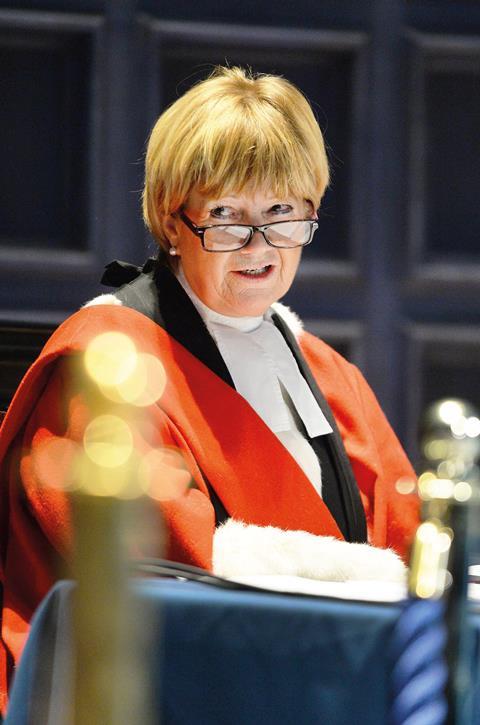
Boris Johnson has a lot to answer for. Once he knew the Commons privileges committee would conclude that he had misled parliament by saying that Covid rules had not been broken in Downing Street, the ex-PM escaped 90 days’ suspension by becoming an ex-MP. However, Johnson will still be an interested party at the High Court when the government seeks to limit the scope of Lady Hallett’s inquiry into the pandemic. What is harder to predict is whether his interest lies in holding back information to protect himself or disclosing information to annoy his successors.
All concerned are hoping that the High Court will hold a ‘rolled-up’ hearing – permission for judicial review and merits – in 14 days’ time. A Friday would be helpful to Hugo Keith KC, counsel to the Hallett inquiry, because there are normally no public hearings at the end of the week.
It’s unusual for the government to publish its written arguments a month before a hearing – and even more unusual for it to be the party seeking judicial review. Officially, the claimant is the Cabinet Office – presumably because Hallett’s formal notice under section 21 of the Inquiries Act 2005 was addressed to that department – though I am not so sure a ministry has legal personality. The claim should surely have been brought in the name of its senior minister, currently Rishi Sunak.
Under section 21, Hallett can require any person to provide documents ‘that relate to a matter in question at the inquiry’. Clearly, she cannot demand material that does not come within the statutory definition. But who’s to say whether individual documents qualify? That’s what the court is being asked to decide.
Ministers argue that an inquiry chair cannot demand the production of irrelevant material. Hallett regards the ‘entire contents’ of the documents on her list ‘to be potentially relevant’. That’s irrational, says Sir James Eadie KC for the government, given the breadth of Hallett’s formal notice.
This covers three types of material. The first relates to phones used by Henry Cook, who was Johnson’s special adviser on Covid and who previously coordinated government communications on the pandemic. Cook, who’s also an interested party in the litigation, now works in public relations.
The second category covers phones used by Johnson himself. In each case, Hallett wants to see unredacted WhatsApp messages from the start of 2020 until February 2022 that were either from a group chat on Covid or were exchanged with some 40 other named individuals.
Finally, Hallett wants to see Johnson’s notebooks and diaries covering the 26-month period.
Under section 5 of the Inquiries Act, the power to demand documents – like other functions – is ‘exercisable only within the inquiry’s terms of reference’. The problem for the government is that the terms of reference Johnson agreed with Hallett were very wide indeed. When the inquiry considers the public health response across the UK, it must examine ‘how decisions were made, communicated, recorded, and implemented’. How could it not be within Hallett’s terms of reference to demand government communications and records?
In his opening statement on Tuesday, Keith said the risks of a non-influenza pandemic had been considered by planners. ‘But fundamentally, in relation to significant aspects of the Covid-19 pandemic, we were taken by surprise.’ So the inquiry will begin by examining whether the UK’s emergency preparedness, resilience and response system was ‘effective and practical, that the bodies and structures that populate it were fit for purpose and not duplicative or obsolete’.
In particular, explained Keith, the inquiry would have to consider whether ‘the decision-makers, the civil servants and those tasked with the responsibility of preparing our systems’ had considered health and social inequalities.
The High Court is being asked to quash the notice Hallett issued under section 21. But Eadie does not seem to be saying she could never issue fresh notices. So the best that ministers can hope for is some guidance on relevance or perhaps an order that documents should be categorised more narrowly in future. The courts will certainly not act as gatekeepers, deciding whether an individual document is one that an inquiry should see.
Eadie argues that Hallett does not have kompetenz-kompetenz — meaning she does not have the power to decide the limits of her own jurisdiction or powers. No former judge would disagree. But that doesn’t mean she should simply sit back and rely on Eadie’s promise to hand over ‘every scrap of relevant material’.
For one thing, the government may not have everything that Hallett needs. I’m not suggesting that former ministers walked off with official documents and left them piled up in the bathroom, an allegation made this week against Donald Trump. But who knows what messages we might find on Johnson’s old phone? As I say, there are lots of questions he needs to answer.































No comments yet